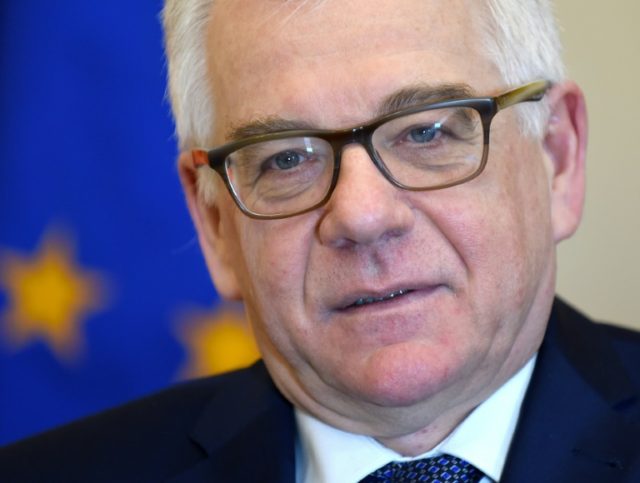Warsaw (AFP) – Poland is hoping to step into the gap after Britain leaves the European Union, emulating its caution over Russia and defence of national sovereignty, Warsaw’s top diplomat has told AFP.
Despite heightened tensions with Brussels over a series of controversial court reforms which could see Poland facing sanctions, Warsaw is determined to drive forward its vision of the bloc’s future after Britain’s departure in March 2019.
“What’s taking shape is the possibility of us taking Britain’s place (in terms of) its programme: commitment to free competition and awareness of the Russian threat, as well a defence of its own positions, of its sovereignty,” Foreign Minister Jacek Czaputowicz told AFP.
Like Poland, Britain had always had a more realistic view of Russian aggression than Germany or France, he said, pointing to the nerve agent attack on a former Russian spy on British soil, with London pointing the finger at Russian President Vladimir Putin.
“We’ve always been wary of Putin’s actions, and we were right,” Czaputowicz said, mentioning Russia’s annexation of Crimea and its action in Syria.
“And now the attempted murder of (Sergei) Skripal. We see a continuation of this policy.”
Following Britain’s lead, Poland, France and Germany have each expelled four Russian diplomats in response to poisoning scandal in a united show of strength.
“It’s an important sign of our unity and a signal to Moscow that it’s not possible to divide Western countries regarding their stance towards Russia,” he said.
– A question of sovereignty –
What does give him pause in Europe, however, is French President Emmanuel Macron’s vision of a “sovereign Europe”.
“It’s impossible to have sovereignty within sovereignty. In other words, a sovereign Europe calls into question the sovereignty of member states,” he said.
The issue could very well come up next month when Czaputowicz, who took over as foreign minister earlier this year, pays his first visit to Paris.
“I doubt the French would accept sovereignty passing over to the EU at the expense of French sovereignty,” he said.
“So it’s necessary to continue the conversation, even as both sides want a strong Europe.”
Czaputowicz also zeroed in on the European Commission, which last year launched unprecedented legal action against Warsaw over the governing conservatives’ reform of the Polish judiciary.
The question, he said, was about the source of the EU’s legitimacy, which Poland sees as stemming from national parliaments.
“We defend parliamentary democracy,” he said.
“The question is about the reinforcement of certain supranational institutions, like the Commission. It’s a question of what is their role — if they are legitimate per se or if they are legitimate by virtue of the member states’ decisions,” Czaputowicz said.
– ‘Cosmetic’ changes –
In December, Brussels triggered Article 7 of the EU treaty over what it sees as “systemic threats” to the independence of the Polish judiciary — in a move that could lead to an unprecedented round of sanctions.
After turning a deaf ear to the EU’s concerns for months, Poland’s rightwing government said last week it would introduce a draft law to slightly modify the judiciary changes.
Western diplomats welcomed the changes — which notably concern the retirement age of judges and the dismissal procedure of chief justices — as a bid to thaw ties with the EU.
But Poland’s liberal opposition believes the changes are merely “cosmetic”.
“There is a willingness to compromise” on Poland’s side, said Czaputowicz, who will meet European Commission Vice-President Frans Timmermans in Warsaw on April 9.
But he said that certain changes “are out of the question — those that could destroy the system put in place.”
Warsaw also wants to revive the so-called “Weimar Triangle” which grouped Poland, France and Germany but was effectively put on hold by Paris after Warsaw abruptly dropped a multi-billion euro helicopter deal with a French aeronautics firm.
Within the group, Poland could also represent other Central and Eastern European countries with which it has “shared interests, shared aspirations within the EU, shared history and the same geopolitical situation,” he said.
Poland could thus “introduce Central Europe’s way of thinking and expectations into a common European vision.”

COMMENTS
Please let us know if you're having issues with commenting.